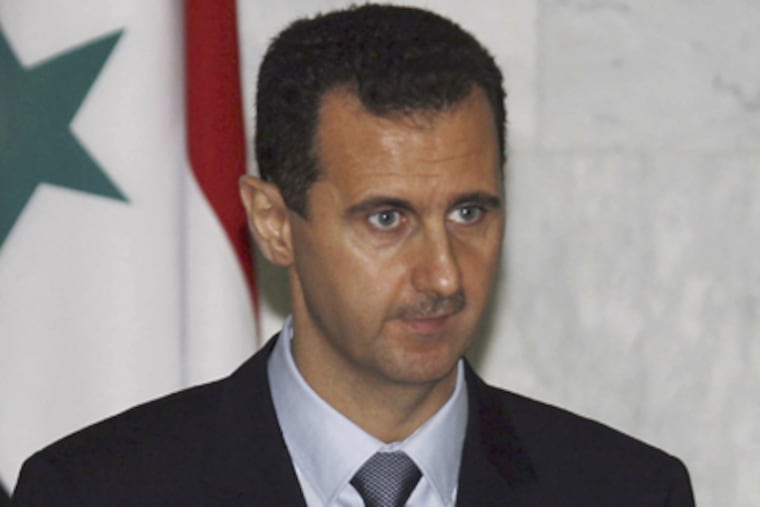Inquirer Editorial: Syrians need a friend
In his May 19 speech on the way forward in the Middle East, President Obama issued this challenge to Syria's leader, Bashar Assad:

In his May 19 speech on the way forward in the Middle East, President Obama issued this challenge to Syria's leader, Bashar Assad:
"The Syrian people have shown their courage in demanding a transition to democracy. President Assad now has a choice: he can lead that transition, or get out of the way."
Assad has opted for none of the above. The ruthless Syrian leader has instead decided to continue his family's 40-year rule by any means necessary, slaughtering and repressing as many of his own people as it takes to hang on.
For evidence, one need only look at how the town of Rastan was pounded by government forces Thursday with artillery and gunfire.
Or the estimated 1,150 people killed in the crackdown against the pro-democracy movement, including 40 in Hama on Friday.
Or the 10,000 or more who have been detained after 10 weeks of anti-government demonstrations.
Or, perhaps most horrifically of all, the reported torture and death of a Syrian boy, 13-year-old Hamza Ali al-Khatib.
Khatib went missing after a protest in his home village of Jiza on April 29. State-run TV reported that the boy had been shot during the demonstration, and an inability to identify the body led to the delay in returning him to his family.
Activists tell a very different story, alleging that the boy was tortured to death and his body mutilated by Syrian security forces.
If confirmed, the photos and video that have been released provide graphic evidence, if any were still needed, of the foolishness in expecting any type of democratic reforms from Assad.
In the video, an unidentified narrator details the wounds: three gunshots to his chest area, signs of a savage beating on his legs, neck broken, castration.
He was tortured in "barbaric, inhuman ways," the narrator says in Arabic. "Look at the scars."
The boy has become the face of the revolution, his death sparking further protests, as well as international outrage. "I can only hope that this child did not die in vain," Secretary of State Hillary Clinton said last week.
Demonstrators in Syria have been holding the child's picture, shouting, "We are all Hamza Khatib." Thousands have signed on to social-media sites dedicated to his memory.
Assad cynically invited Khatib's family to meet with him, and he has promised an investigation. He has even released some prisoners swept up in the crackdown, and promised a limited amnesty to others.
Many Syrians aren't buying it. In fact, opposition groups were meeting in Turkey last week, hoping to show the world a glimpse of life in post-dictatorship Syria.
Those efforts deserve far stronger support than what has been offered thus far. How else to answer the plea of the narrator in the Khatib video?
Those who profess to uphold freedom must do more than offer lip service in support of the Syrian people.